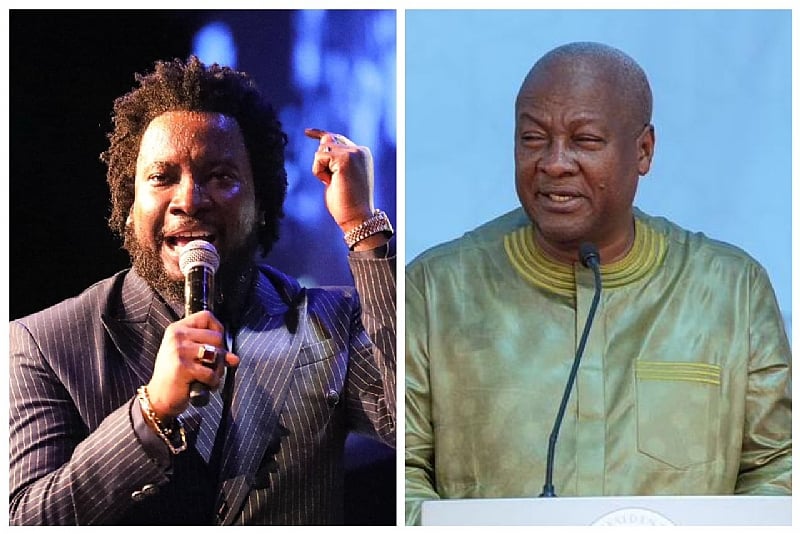Sonnie Badu, a celebrated gospel musician and founder of Rockhill Church, has ignited a flurry of speculation and discussion with his recent prophecy concerning Ghana’s newly inaugurated President, John Dramani Mahama. Badu, known for his profound spiritual insights and impactful music ministry, took to social media following Mahama’s inauguration on January 7, 2025, to share his divine premonition. He boldly declared that Mahama’s political journey was not yet complete, suggesting a forthcoming transition into a pastoral role. This prediction, which Badu framed as a prophecy, sparked widespread interest and generated varied reactions from the public, given the unique intersection of politics and religion it presented. The prophecy adds another layer of intrigue to Mahama’s already remarkable political career, marked by both triumphs and setbacks.
Badu’s prophecy, disseminated through an Instagram post, carries significant weight given his established reputation within the religious sphere. He not only leads a thriving congregation but also commands a large following who respect his spiritual pronouncements. In his message, Badu expressed admiration for Mahama’s resilience and determination, particularly in light of his recent political comeback. He characterized Mahama’s return to the presidency as a fulfilled mission but pointed towards another, seemingly unexpected, chapter awaiting the newly sworn-in leader. This “hurdle,” as Badu described it, involves Mahama transitioning from the political arena to the spiritual realm, assuming the mantle of a pastor. This unexpected prediction resonates with the broader theme of service that has characterized Mahama’s career, albeit in a vastly different context.
The crux of Badu’s prophecy lies in the assertion that Mahama will be ordained as a pastor, a role traditionally associated with spiritual guidance, community leadership, and moral instruction. This prediction raises several compelling questions about the future trajectory of Mahama’s life and its potential impact on Ghana’s socio-political landscape. Would Mahama’s pastoral ordination, should it come to pass, influence his presidential decisions and policies? Would it lead to a greater emphasis on moral and ethical considerations in governance? These questions remain open to speculation, but Badu’s prophecy undoubtedly adds a new dimension to Mahama’s presidency, prompting contemplation on the interplay between faith and politics.
The potential convergence of these two distinct spheres – the presidency and the pastorate – is further underscored by Badu’s concluding remark. He posited that Mahama “might become the first pastor to serve as a president.” This statement highlights the unprecedented nature of the situation, suggesting a potential blurring of the lines between secular leadership and spiritual authority. Such a scenario, while unprecedented in Ghana, raises intriguing questions about the potential synergy or conflict that might arise from this unique combination of roles. Could Mahama’s pastoral calling enhance his leadership by fostering a deeper sense of empathy, compassion, and moral responsibility? Or could it potentially lead to accusations of bias or favoritism towards certain religious groups? These are critical considerations that warrant thoughtful analysis and discussion.
John Dramani Mahama’s inauguration as the 6th President of the 4th Republic of Ghana on January 7, 2025, marked a significant milestone in his political career. His return to power, following his previous term from 2013 to 2017, underscores his resilience and the unwavering support he commands from a significant portion of the Ghanaian electorate. The inauguration ceremony, presided over by Chief Justice Gertrude Torkornoo at the Black Star Square in Accra, was a momentous occasion, symbolizing the peaceful transfer of power and the enduring strength of Ghana’s democratic institutions. Mahama’s re-election is particularly noteworthy given his previous electoral defeat, making him the first president in Ghana’s 4th Republic to regain the presidency after a prior loss.
Mahama’s return to power represents a remarkable feat of political perseverance and strategic campaigning. His victory demonstrates his ability to connect with the electorate, address their concerns, and articulate a vision for the future that resonated with a significant segment of the population. His victory also speaks to the dynamic nature of Ghanaian politics, where electoral fortunes can shift dramatically, and second chances are possible. The political landscape in Ghana remains lively and competitive, with various political forces vying for influence and power. Mahama’s re-election signifies his enduring relevance and his ability to navigate the complexities of Ghanaian politics effectively. The coming years will undoubtedly be a period of intense scrutiny as he embarks on his second term, tasked with addressing the numerous challenges facing the nation. The backdrop of Badu’s prophecy adds another layer of complexity to his presidency, raising expectations and prompting observers to closely monitor the potential intersection of his political leadership and spiritual calling.


